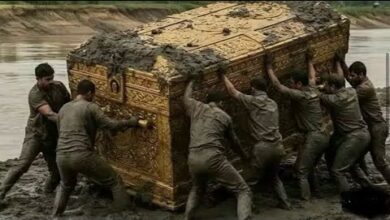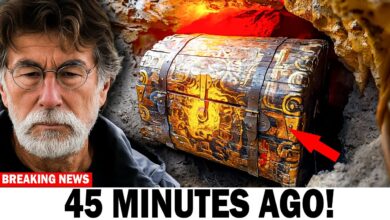Marty Lagina Just Found The BIGGEST Treasure At THE OCEAN FLOOR!!
Marty Lagina Just Found The BIGGEST Treasure At THE OCEAN FLOOR!!

Was really really cool.
We have got another nonfer city here that is going to be something good.
Should be able to pinpoint…
🎵 [Music]
Come on, where are you?
Lead to untold treasures waiting to be discovered.
Marty Lagina’s latest expedition takes us on a journey unlike any other, blending historical research with cutting-edge technology to uncover the secrets of the ocean floor.
But as the allure of sunken riches draws us into its depths, we find ourselves entangled in a complex web of ownership disputes and legal battles, where the fate of discovered treasures hangs in the balance.
What secrets lie hidden beneath the waves?
And what challenges await those who dare to uncover them?
The allure of discovering sunken treasure has captivated the human imagination for centuries.
Yet the moment a treasure is lifted from its watery grave, it often sparks a complex web of legal battles over ownership, intertwining the fates of treasure hunters, governments, and sometimes even nations.
Marty Lagina’s latest foray into the depths of the ocean to retrieve a long-lost treasure thrusts us into the heart of these complexities, echoing the challenges faced by many before him.
The case of Bobby Pritchett, a seasoned treasure hunter whose discovery turned into a legal nightmare, serves as a case study highlighting the dangers that lie in the murky waters of treasure claims and governmental roles.
When a treasure is discovered, the initial euphoria can quickly be overshadowed by the legal complexities surrounding its ownership.
National laws, international treaties, and maritime salvage rights converge to form the labyrinthine legal framework that governs the fate of any discovered treasure.
In many jurisdictions, the law of finds and the law of salvage come into play—each with its stipulations and implications for the finder.
The former grants ownership to the finder of abandoned property, while the latter rewards them for the recovery of property that remains owned by someone else.
Governments often claim ownership of historic shipwrecks and their cargos under cultural heritage laws, arguing that such treasures are part of the nation’s patrimony and should be preserved for public benefit.
This stance is supported by UNESCO’s 2001 Convention on the Protection of the Underwater Cultural Heritage, which aims to safeguard submerged historical artifacts as cultural heritage rather than mere commercial property.
However, the applicability of these laws and conventions can vary widely depending on the territorial waters in which the treasure is found and whether the countries involved are signatories to international agreements.
Bobby Pritchett’s ordeal epitomizes the legal entanglements that can ensnare treasure hunters following a significant discovery.
After years of research and investment, Pritchett discovered a shipwreck believed to be laden with valuable artifacts and precious metals off the coast of Florida.
His excitement was short-lived, however, as he found himself entangled in a legal battle that would consume years of his life and vast sums of money.
In the shadowy depths off the coast of Cape Canaveral, Florida, treasure hunter Bobby Pritchett came across a discovery that promised to rewrite a chapter of maritime history.
“It’s like, man, I can’t believe it. We just found it. I mean, it’s quite amazing.”
His find—a sunken treasure consisting of a marble obelisk and a 16th-century bronze cannon engraved with the French fleur-de-lis—initially seemed to reinforce Spanish dominance in maritime explorations of that era.
However, this significant discovery soon became the epicenter of a contentious legal battle that underscored the complex web of maritime law, national heritage claims, and the relentless quest for historical treasures lying beneath the ocean’s surface.
Pritchett’s discovery suggested more than just the presence of valuable artifacts.
It hinted at the existence of a shipwreck of monumental historical importance.
The initial assumption was that these artifacts belonged to a Spanish shipwreck, given Spain’s extensive exploration and colonization efforts during the 16th century.
However, the narrative took a dramatic turn when the Florida government, upon examining the distinctly French artifacts, posited that the wreckage could be none other than La Lune, a vessel from a French fleet that had left France in 1565 with intentions of establishing a foothold in the New World.
La Lune was part of a larger narrative involving French Huguenots’ attempts to colonize parts of what is now the southeastern United States.
The ship, alongside others, was dispatched to support Fort Caroline near modern-day Jacksonville, Florida.
However, the fleet met with disaster, and La Lune, along with its historical treasures, was believed to have been lost to the sea—its final resting place becoming one of the many mysteries that have tantalized historians and treasure hunters alike.
The contention over the ship’s identity marked the beginning of Pritchett’s legal and bureaucratic journey.
The Florida government’s assertion brought into play international laws and agreements concerning underwater cultural heritage.
The discovery of what might be La Lune was not just about the artifacts themselves, but also about the historical significance and ownership rights tied to them.
According to maritime laws, shipwrecks can be protected as part of a country’s underwater cultural heritage, meaning that the artifacts belong to the nation under whose flag the ship sailed.
This legal framework set the stage for a complex negotiation process involving the country of origin—in this case, France—and the country where the shipwreck is found—in this instance, the United States, specifically the state of Florida.
The involvement of French artifacts complicated matters further, introducing the possibility of repatriation of the artifacts to France, thereby stripping Pritchett of any claims to the treasure he had discovered.
Pritchett found himself entangled in a nightmare of legal disputes and negotiations.
What began as a thrilling discovery soon turned into a cautionary tale about the challenges and pitfalls of treasure hunting in the modern age.








